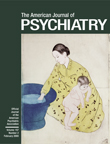Risperidone Treatment for Psychosis in End-Stage Friedreich’s Ataxia
Mr. A was a 36-year-old Caucasian man who had had Friedreich’s ataxia since age 5. Dysphoria, decreased energy, poor concentration, and anhedonia had evolved over several months. A previous 2-month trial of fluoxetine, 20 mg/day, resulted in no improvement. Mr. A was in a wheelchair and had recently lost the ability to perform daily functions, such as maintaining hygiene and caring for his daughter. His most recent decrease in function made him entirely dependent on care provided by his mother. Mr. A’s family history was notable for an older brother who also had Friedreich’s ataxia and died at the age of 34 from the illness.His mother reported a gradual onset of unusual behaviors that Mr. A minimized and rationalized as part of his sensory deterioration. At home, he kept the radio on to drown out frightening sounds that he (but no one else) heard. He developed paranoia and multiple conspiracy theories, e.g., believing his ex-wife had thrown a puppy out of the window, even when presented with evidence to the contrary. He developed visual hallucinations that included seeing an aide walk into the room and then vanish.We diagnosed Mr. A with psychotic disorder not otherwise specified and started him on a regimen of 1 mg of risperidone at night, increased to 1 mg b.i.d. after 1 week. His dysphoria improved, the delusions about his caregivers and his ex-wife resolved, and his visual hallucinations diminished. He experienced no extrapyramidal symptoms or other side effects. He became more observant and more insightful into his health status and was able to address many end-of-life issues as his thought organization improved. He died from progressive cardiac complications of Friedreich’s ataxia 6 weeks after starting risperidone treatment.
References
Information & Authors
Information
Published In
History
Authors
Metrics & Citations
Metrics
Citations
Export Citations
If you have the appropriate software installed, you can download article citation data to the citation manager of your choice. Simply select your manager software from the list below and click Download.
For more information or tips please see 'Downloading to a citation manager' in the Help menu.
There are no citations for this item
View Options
View options
PDF/ePub
View PDF/ePubGet Access
Login options
Already a subscriber? Access your subscription through your login credentials or your institution for full access to this article.
Personal login Institutional Login Open Athens loginNot a subscriber?
PsychiatryOnline subscription options offer access to the DSM-5-TR® library, books, journals, CME, and patient resources. This all-in-one virtual library provides psychiatrists and mental health professionals with key resources for diagnosis, treatment, research, and professional development.
Need more help? PsychiatryOnline Customer Service may be reached by emailing [email protected] or by calling 800-368-5777 (in the U.S.) or 703-907-7322 (outside the U.S.).

